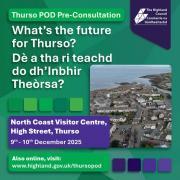Highland Council Considers Planning For 3-year Budget Gap
7th September 2018
The Highland Council has agreed to plan for a potential budget gap of £66.7 million over the next three years.
It was agreed by Members in June to develop plans for a multi-year budget for the next 3 financial years (2019-22) to meet the challenge of a potential funding gap dependent on a wide range of variables.
The budget assumptions are based on two key variables, namely the level of revenue grant funding received from the Scottish Government and the annual staff pay award. The budget gap could range from £34.1m to £124.9m, because the Council has no certainty on either of these variables. Having such a wide potential range for the budget gap, makes planning work incredibly difficult, and so it has been decided that the budget planning will focus on a scenario of a 1% annual reduction in government grant funding and an annual 3% pay award. Setting the variables at this level assumes a budget gap of £66.7m over the 3 year period.
Over the period 2013/14 to 2018/19 the Highland Council has already had to approve budget savings of £102.1 million as well as agree Council tax rises of 3% in each of the last two years in order to deliver a balanced budget.
Budget Leader Councillor Alister Mackinnon said: "In Scotland, local government has probably been the hardest hit of the wider public sector in terms of real terms reductions in funding. This Council has seen a cut in real terms over the past 5 years and the outlook continues to look grim.
"The future is by no means certain, but by assuming a budget gap of £66.7m, this allows us to prepare a plan which we can adapt as new information arises. This way, by starting our planning early, we can prioritise and accelerate proposals or defer certain options if we can.
"Work is already well advanced in developing information to inform the budget process. This involves taking a close look at services and identifying where there are opportunities for becoming more efficient and commercial and ensuring there is best value for every penny spent."
He continued: "It has not been easy in the past budgets and it will not be easy to find even more savings on top of those we have already made. Income generation, commercialisation and efficiencies become even more vital in this context in order to protect essential services and we do not have the luxury of the significant reserves we once had to give us any wriggle room. It is undoubtedly the case that there will be very hard decisions to make and we all need to work across the chamber to do the best we can for the people of the Highlands."
A recently produced report by SPICe highlights that between 2013/14 and 2017/18 there was a 7.1% fall in the local government revenue settlement in real terms. Over that same period the Scottish Government revenue budget decreased by 1.8% in real terms. The same SPICe report identifies that over the period 2013/14 to 2018/19 Highland Council has seen a reduction in funding per head of population of £172, the fourth highest of all mainland authorities.
Related Businesses
Related Articles
Exciting Career Opportunities With The Highland Council Now Open For Applications
# 10 December 2025 Career opportunities with The Highland Council The Highland Council is looking to fill a variety of posts relating to civil engineering and flood risk management based in locations across the area. Included are opportunities specifically for civil engineering graduates and technicians, providing the ideal job with career progression for anyone recently qualified and ready for a varied and interesting role.
What the NC500 Research Projects Are Designed to Do - and Why They Matter for the Highlands
As the North Coast 500 approaches its tenth anniversary, it has become one of Scotland's most well-known tourism success stories. The 516-mile loop around the far north of the Highlands has been celebrated internationally, marketed as a world-class road trip, and credited with transforming visitor numbers in some of Scotland’s most remote areas.Help Shape the Future of Thurso
The Highland Council is inviting people that live, work, or study in Thurso, to come along to the public consultation events to have their say. This is an opportunity to help shape the future of Thurso, to gather views and ideas.
Are Scottish Councils Quietly Reversing Outsourcing? A Look at Insourcing, Cuts and the Highland IT Shift
A notable article in the Guardian on 6 December 2025 noted the high sums being paid by London councils outsourcing services to private firms. The article starts with the reduction in council funding by UK government since 2010.Council welcomes Visitor Levy flexibility plan
The Highland Council welcomes moves by the Scottish Government to introduce greater flexibility on how it could design a Visitor Levy Scheme for consultation. The Visitor Levy (Scotland) Act 2024 currently provides local authorities with discretionary powers to implement percentage-based levies following statutory consultation.Highland Council is reaching out for views to shape its next 26/27 budget.
As it looks to set out its forthcoming priorities, the council is seeking involvement from members of the public, including businesses, community groups, parents, and young people. All their opinions are going to be crucial in deciding how Highland Council will take on its budget challenge for 2026-2027.Have your say in Thurso's future £100million investment by attending public consultation events
Thurso is to benefit from £100m investment in education and community facilities and are rolling out the first phase of public consultations on 9 and 10 December 2025. The Highland Council is inviting people that live, work, or study in Thurso, to come along to the public consultation events to have their say; this is an opportunity to help shape the future of Thurso, to gather views and ideas.Finding new owners for empty homes - Scheme launched to help return more empty homes to active use
A new online portal has been launched to bring empty homeowners together with prospective buyers or developers with the aim of facilitating more properties to be used as homes again. Covering the whole of Scotland, this builds on the success of local pilots, referred to as "matchmaker schemes".Consideration for short term let control area in Skye and Raasay
Steps towards introducing a short term let control area have been considered by Highland Council's Isle of Skye and Raasay area committee. On Monday (1 December 2025) the committee heard evidence to justify the grounds for the introduction of a Short Term Let Control Area covering all or part of Skye and Raasay.Workforce North event spotlights Highland economy
EMPLOYERS and educators from across the Highlands have gathered to hear how a new initiative is aiming to transform the region's economy. Workforce North - A Call to Action brought together business leaders and teachers from primary and secondary schools from across the Highland Council area with a wide range of partners geared towards education, learning and skills development at Strathpeffer Pavillion.
